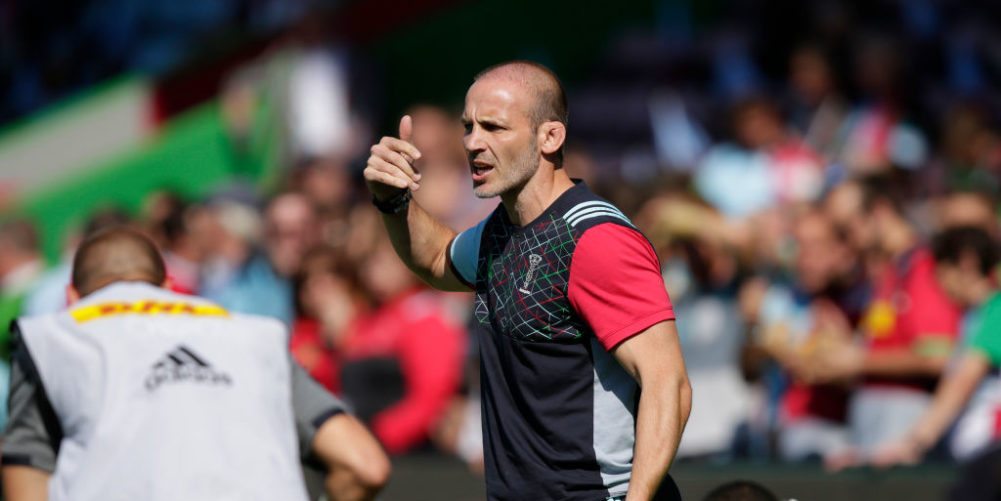Harlequins have a great tradition as the aristocrats of English rugby, with their coloured quartered shirts having been worn by many of the big characters and great players of the game.
Their support behind the scenes used to be a Who’s Who of London business, both in the City and outside it, and during the amateur era they had one of the strongest identities of any club side. However, a bit like Bath, they are a club that has struggled to replicate their previous success and standing since the game went professional.
Harlequins have endured a slow decline since winning the Premiership title for the first time in 2012 under Conor O’Shea, and last season they slumped to tenth in the league. In the second half of the season they just plummeted, and by the end appeared to be dispirited and almost disinterested, eventually leading to the departure of head coach John Kingston after 17 years at the club.
Those difficulties on the field contrast with a strong presence in the local community, where Harlequins are highly thought of for the contribution they make.
The problem is that professional sport depends on success on the field, and the responsibility for getting Quins back to the top end of the table has been given to Paul Gustard, who was England defence coach until the end of June.
Gustard has the pedigree of being part of the Leicester school of hard knocks as a back row forward. Having been part of a dominant Tigers pack he also knows all about high levels of expectation from supporters who are used to winning, so he will understand the disappointment Quins fans felt in their team last season.
After a playing career that continued at London Irish and Saracens he went into coaching and made a name for himself in defence. Gustard developed the Wolfpack concept at Saracens and went from strength to strength with the club before Eddie Jones came calling.
My belief is that defence is all about having the right attitude – although it is not as simple as that. You must also have the right technique, and when you have trained your team hard in both areas you still have another step to take.
That step is creating energy so that your team thrives on the right form of communication. It’s no good having lots of ‘caveman’ noise because it gets confusing, so coaches like Gustard encourage ‘clever’ noise to keep each defender in the picture and on their toes.
That creates the right culture, and it is reflected in the Wolfpack approach that Saracens still thrive on. When Gustard first became part of the England coaching set-up he brought that energy with him, and shared in the unbeaten run in 2016 that led to a Six Nations Grand Slam and a tour whitewash of Australia.
After that there was a gradual slip in standard, and last season the way that England were leaking tries meant that the defence in the 2018 Six Nations and the tour to South Africa was lacking in certain areas. As a result, Gustard’s sign off with England didn’t go as well as he would have wanted.
However, his appointment as Harlequins DoR means he has taken the next step up the coaching ladder. He is the man accountable at the Stoop, the man who win or lose is where it all stops.
Gustard knows that something dramatic happened Quins for them to fall off the cliff in the way they did last season, and he needs to find out quickly what the extent of the injury is. It is also likely that a band-aid won’t fix it, and major surgery is required.

He has the advantage of already knowing England players like Mike Brown, Danny Care, Chris Robshaw, Joe Marler, Kyle Sinckler, and Jack Clifford pretty well. He is also probably familiar with Joe Marchant, a talented England U20 centre I thought would have broken through into the senior squad by now.
Another Harlequins back Gustard is familiar with is 19-year-old England squad fly-half Marcus Smith. The youngster clearly has a very good rugby brain and a great skill-set, and they have as good a half-back combination as any in the Premiership with him and Care.
Nevertheless, Smith still has a great deal to prove at international level. While I believe he has every chance of playing for England, my view is that while Smith will be a very good club player he will do well to have a long Test career.
One of the main drawbacks Quins have to overcome is that despite their England forwards they do not have a reputation for having a consistent, hard-edged front five.
You won’t get many more consistent club performers than Robshaw at blindside, but England props like Marler and Sinkler have to follow suit for Quins to make strides, and the same is true of their former Wallaby lock James Horwill.
It’s up to Gustard to generate a real sense of competition for places within the squad, and to develop replacements who are effective to 90 per cent of the level of whichever players are on international duty with England.
Some coaches in specialist roles don’t want to be the number one, but Gustard has ambition and wants to be the top man. He has got the track record, having learned his trade under very good head coaches like Brendan Venter and Mark McCall, but now he is going to find out if he’s got what it takes.
Gustard is well regarded by players and other coaches alike, but the challenge facing him is getting this Harlequins squad to click and start enjoying their playing careers to the full. Great coaches ease pressure by inspiring players, and Quins have a great chance to get a sprint start with only one top six team from last season – Bath – in their first five fixtures.
There were no star signings over the summer, so Harlequins, with Robshaw and Horwill as co-captains, are relying on what they have, plus a few additions from their academy.
My hope is that Gustard takes the risk in the Premiership of adopting a similar attitude to Gregor Townsend, encouraging intelligence and an enjoyable style of play rather than being shackled by fear of relegation. The reality is that below Exeter and Saracens there is not much separating any of the sides from three to 12 in the table.
Coaches have to realise they have got the scope to play a game that means you will score three or four tries irrespective of the weather. That’s what good teams with ambition do. It’s what New Zealand do, and it’s what Saracens do.
Paul Gustard’s reputation as a defence coach may have been slightly tarnished over the last 12 months with England, but as a young coach I wish him well. He’s English, and if he is successful at the Stoop there is no reason why he should not be successful again with England in the future.























